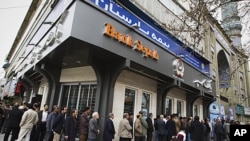Parliamentary Election Facts
- Candidates are cleared by the Guardian Council.
- 3,444 candidates are running out of the 5,395 who registered.
- Parliament has 290 seats.
- Voters must be over 18 years old.
- 48 million people of Iran's 74 million strong population are eligible to vote.
- Ballots are counted manually.
Voting has ended in Iran's parliamentary elections after the interior ministry kept the polling stations open for several additional hours because of the long lines of people waiting to cast their ballots.
Iranian state media claim a "massive turnout" for the Friday elections, which are likely to solidify Supreme Leader Ayatollah Ali Khamenei's control over conservative rivals tied to President Mahmoud Ahmadinejad.
Some 3,400 candidates are vying for seats in the 290-member parliament. More than 48 million Iranians are eligible to cast ballots.
Iran's main opposition and reformists groups boycotted Friday's election, the first since the disputed 2009 presidential vote. Mostly hardliners' names appeared on the ballots. All candidates were cleared by the Guardian Council, a powerful group of Islamic experts and jurists that rules on constitutional issues.
Iran's conservative government and clerical leaders have pursued a crackdown on the reformist movement since it staged mass protests against Ahmadinejad's re-election.
Ayatollah Khamenei predicted that a big turnout would represent an act of defiance toward Iran's enemies. He was referring to Western powers leading a sanctions campaign against Iran's controversial nuclear program, and to Israel.
Western powers have tightened sanctions as a means of pressuring Iran to stop nuclear activities that could be used to produce weapons. Iran says its nuclear program has purely peaceful goals.
During Friday prayers, conservative cleric Kazem Sedighi addressed worshippers chanting anti-American slogans. Sedighi told the crowd that Friday's elections showed the world that Iran's reformist leaders do not have the support they once did.
"In this round of elections they [the West] were under the impression that they can do something because the leaders of sedition [Green Movement leaders Mir Hossein Mousavi and Mehdi Karroubi] were absent, and they assumed these [leaders] still have supporters and because of that they can do something [sabotage the Iranian government]," said Sedighi. "However, whenever our vigilant, insightful people by the grace of God felt that the enemy was plotting, they came out and made an outstanding turnout."
After casting his vote, Iran's former president Ali Akbar Hashemi Rafsanjani said he wishes the election results would come strictly from the ballot boxes. Rafsanjani heads the powerful Expediency Discernment Council, which advises the country's Supreme Leader on policy and seeks to resolve deadlocks between lawmakers and the Guardian Council.
"God willing, the outcome of the elections will be what the people want, and the result will come from the votes they cast into the ballot boxes. If it will be so, God willing, we will have a good parliament, because the people really care about Islam, the Revolution and Iran. The people's choice is really important. I hope that people, with their effective participation, turn the parliament into such a place that can be effective at this critical time for our country," said Rafsanjani.
Iran's Guardian Council says no outside organizations will be permitted to monitor the turnout or vote-counting process. Council spokesman Abbas Ali Kadkhodaei said Thursday the presence of international observers would be an "insult" to the Iranian people.
| Join the conversation on our social journalism site - Middle East Voices. Follow our Middle East reports on Twitter and discuss them on our Facebook page. |
